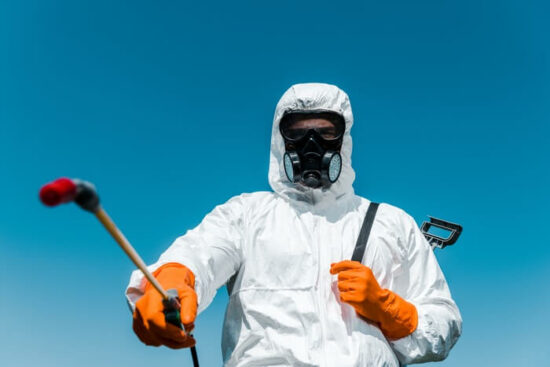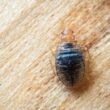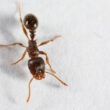It’s only natural to have a handful of questions when working with an ant exterminator for the first time.
What do they do? How effective are their treatment methods? Is there anything I should do to help them out?
This guide will answer all of those questions to make you completely comfortable about working with an exterminator for ants.
Let’s begin.
Table of contents
What Does An Exterminator Do For Ants?
If you suspect that you have an ant infestation inside your home, you may decide to try the do-it-yourself route first. This is alright, but attempting to get rid of ants that are already established in your home can be messy, frustrating, and potentially costly. In the long run, it’s not uncommon for homeowners to end up with results that they’re not completely happy with when trying to do things on their own.
And that’s when it might be time for you to work with a professional ant exterminator. By this we mean ant control specialists who are licensed and experienced in various kinds of pest control.
Quick Tip: Getting rid of your ant problem is a lot more complicated than just spraying some poison around. Your ant exterminator will need to go through a series of important steps before they can even begin the extermination process.
- Kills common household ants including acrobat, crazy, ghost, little black, odorous house, pavement, and other sweet-eating ants
- As worker ants discover the bait, they share it with the rest of the colony to eliminate them all
- You should see a significant decrease in the number of ants visiting the bait stations within just a few days
- Place stations near areas where you’ve seen ant activity
Since there are many different types of ants, the professional will need to determine which type or types of ants are causing your infestation.
Why is this step so important? Depending on the type of ant you have, the exterminator will probably need to approach the situation in different ways. For example, if you want to get rid of sugar ants, you’ll need a specific treatment regimen. On the other hand, getting ants out of electronics will require an entirely different strategy.
Once the type of ant is identified, a more thorough examination of the situation will be necessary. The ant exterminator will try to find out what is attracting the ants to your home, and they will also attempt to determine the point where the ants are coming in. This can take quite some time, so be patient and let the exterminator poke into all the interior and exterior nooks and crannies of your home.
After the source of the infestation is found, you and the ant control specialist will discuss treatment methods. Let your exterminator know if you have children or pets in your home. This information is an important factor that the specialist will need to consider when coming up with your individual treatment plan.
Once all the factors have been discussed, a treatment plan will be proposed. This is the time to ask questions and voice any concerns. Remember, you are a partner with your ant exterminator, so it’s best to come up with a plan that everyone feels comfortable with.
The Advantage Of Using A Professional Ant Exterminator
As we just discussed, many people try to deal with the ant infestation themselves. You can go to any hardware store and find a slew of treatments like borax that are pretty effective and easy to use. There are also plenty of all-natural remedies that are floating around the internet, but these methods are really just a temporary fix.
But nothing compares to working with an exterminator for your ant problem. Sure, you may see the ants disappear for a while after your DIY treatment, but a decent number of homeowners find that they come back after a while (especially if you have a serious infestation). Unless you actually kill the queen in the colony, you are not going to totally solve your problem.
Quick Tip: In fact, the colony may even go through something called budding. If this happens, you will have a big problem on your hands.
If you are considering trying your hand at ant extermination because it seems like a faster and more inexpensive way to go, that’s completely fine. But for some homeowners, going with a professional ant control specialist ends up being easier and cheaper in the long run.
One of the main advantages of seeking professional help for your ant infestation problem is that an ant exterminator has years of training and experience. They are familiar with the various types of ants that frequently invade homes, they know how to find entry points, and they have an arsenal of chemicals and treatment solutions that are not available to the general public.
Getting Your House Ready For Treatment
We mentioned earlier that you, as the homeowner, are an important component of the partnership between you and the ant exterminator you’re working with. This means that just as the pest control specialist will need to prepare the plan, you will need to get your house ready for the treatment.
It is extremely important to follow all of the instructions that your ant exterminator gives to you. Skipping steps or doing them halfway may cause your treatment to be less effective, and you may be putting the health of your family at risk. We know that it’s going to seem like a lot of work, but the effort that you put into the preparation will be well worth it.
- Kills common household ants including acrobat, crazy, ghost, little black, odorous house, pavement, and other sweet-eating ants
- As worker ants discover the bait, they share it with the rest of the colony to eliminate them all
- You should see a significant decrease in the number of ants visiting the bait stations within just a few days
- Place stations near areas where you’ve seen ant activity
The first, and maybe most important, thing is to very carefully wipe down all countertops, floors, and other surfaces in your kitchen (make sure to check the sink). After this is done, you will need to vacuum the entire house to make sure that there are not any crumbs or other attractors. Sticky surfaces and crumbs can cause the ants to detour from the treatment area.
Quick Tip: Don’t forget to clean up any pet areas after your pet has finished eating. Pet food is a notorious temptation for ants, so leave your pet’s feeding spot free of leftovers.
Your ant exterminator is also going to ask you to put all open food items into sealed plastic bags, plastic containers, or the refrigerator. It’s also a good idea to wipe down bottles that contain sticky substances such as honey, molasses, ketchup or maple syrup. Basically, you are trying to eliminate anything that may tempt ants away from the treatment area.
Other prep work you may be required to do includes taking out the trash on a regular basis, running your dishwasher every day, rinsing your recyclable items and bringing the recycling to the appropriate receptacle daily.
Lastly, you’ll need to keep tabs on the locations where you see ants. We suggest keeping a small notebook where you can log your observations on a daily basis. Your exterminator needs to know about any changes in ant behavior that may have occurred after their initial assessment.
How Long Will It Take To See Results?
After you’ve prepared your home for treatment and the ant exterminator has done their job, you’ll be ready to sit back and enjoy an ant-free home. Unfortunately, it’s not usually that easy. Despite your expectations, the results of an ant extermination treatment are not instant.
As difficult as it may seem at the time, you will need to be patient for a little while until the treatment has time to work. In fact, it’s possible to see ants for a few weeks after the initial treatment. Not only that, but you may experience a bigger ant swarm than you had before you called the exterminator.
This “mega swarm” is understandably upsetting to most homeowners, but we assure you that it is perfectly normal and expected. When the treatment is put down, the ants are driven from their hiding places, their trails are disrupted, and the whole colony is in chaos. If ant baits were put down, ants will swarm en masse to the area. It will take some time for the poison to get to the queen and wipe out the colony.
After the swarming stops and you find yourself without any more ants, you may still see a few once in a while. Keep an eye on the situation, and let the ant exterminator know if you feel that things are getting out of control again.
Chemicals Exterminators Use For Ants
The chemicals that are used by ant exterminators are very potent and potentially hazardous, so we highly recommend using a pest control professional who is experienced and has a good reputation.
Quick Tip: A responsible exterminator will always discuss the chemicals they want to use, they’ll be open about any potential health hazards, and they will be willing to listen to your concerns. If this is not the case, try another company.
The most common chemicals that exterminators use for ants contain either pyrethroids or pyrethrins. These chemicals work to paralyze the ants and kill them. Pyrethrins are chemicals found in chrysanthemums, and are often used in many kinds of pest control products. Pyrethroids are synthetic versions of naturally occurring pyrethrins. Because these chemicals are relatively safe around people and pets, they are often a pest control chemical of choice.
Ant exterminators have many other chemicals in their arsenal, and most of them are only available to professionals. Having so many different options allows your exterminator to create the perfect chemical cocktail for your unique situation.
Some of these chemicals are extremely toxic to humans and pets, so remember to voice any concerns with your ant exterminator. Let’s take a quick look at a few of the other chemicals that your specialist may want to use.
Piperonyl butoxide is usually added to another chemical to give it added strength. This chemical is considered to be a carcinogen, and it can cause allergic reactions like vomiting and diarrhea.
Another category of chemicals is the growth-regulators. These chemicals are designed to keep young ants from developing into adults. This method may take longer to work, but it can be very effective. The two most common growth-inhibitors include methoprene and pyriproxyfen.
Avermectin, neonicotinoids and hydramethylnon are other chemicals that your ant exterminator may suggest using.
Conclusion
Now that you know what an exterminator does for ants and what to expect from the process, all that’s left is to pick up the phone and schedule a consultation. Professional ant control tends to yield better results than DIY methods, so we highly recommend it if you have a serious infestation.



